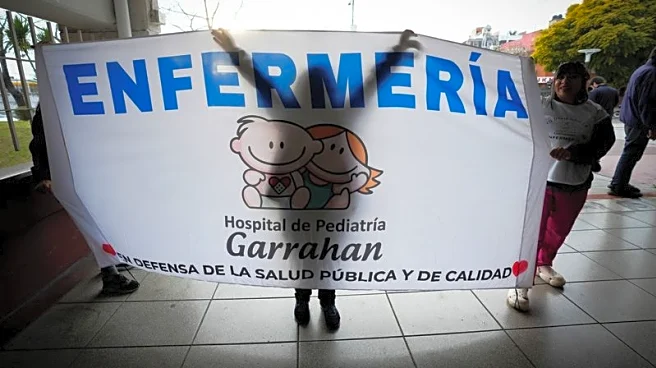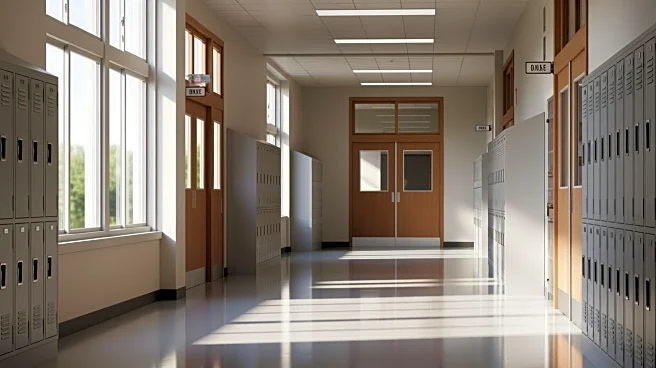By Nicolás Misculin
BUENOS AIRES (Reuters) -Argentine President Javier Milei's hopes of gaining greater control of the legislature in upcoming midterm elections could be facing a stiff challenge from his
determination to veto more funding for struggling public hospitals, latest polls suggest.
Milei has been riding a wave of popular support after taming seemingly intractable inflation, which is expected to fall below 30% annually in 2025 compared to triple-digit figures in the recent past.
But his slashing of public spending is putting at risk the future of the country's once enviable state health system, including its crown jewel.
Known for its world-class expertise in surgery and organ transplants, the Garrahan children's hospital in Buenos Aires has become a symbolic battleground in a worsening crisis for state hospitals, with public anger fueled by staff reductions and delays in patient care.
Doctors and other hospital workers at the hospital told Reuters that their purchasing power has plunged by roughly 50% since late 2023 - with salaries not keeping pace with inflation - and many have left for more lucrative private-sector jobs.
"Getting into this hospital was like making the national soccer team," said Santiago Weller, head of urology at Garrahan. "But the wage gap is driving many people to leave. Teams fall apart, and quality care is no longer provided."
The opposition-controlled Congress has voted for an extra $98 million a year in fresh funding for the national public health system, but a government spokesman has said Milei will veto the bill next week, in line with his vow to veto any project that could impact the fiscal balance.
Recent polling indicates that such a move could risk Milei's ability to consolidate power in the crucial October 26 midterm vote that could make or break his pro-market agenda.
A poll by San Andres University published in July shows the federal government's health policies top the list of Argentines' complaints about Milei's policies, with 53% of respondents describing themselves as "very unsatisfied," outranking their concerns over nine other key issues.
Argentines will elect half the seats in the lower house of Congress and a third of senate seats in October, an opportunity for Milei to expand the foothold of his government from its current minority. A bigger congressional bloc would give him a freer hand to more easily block opposition measures seeking to strike down his reforms aimed at winning investor confidence and liberalizing trade.
Investors - who have been tentatively placing bets on an economy once seen as an international pariah - will be closely watching whether Milei nets enough political support to push forward with his policies.
The midterms will be preceded by local elections in Buenos Aires province on September 7, traditionally held by the Peronist opposition. On Wednesday, Milei's security detail rushed him out of a neighborhood in the province after protesters launched rocks at his vehicle.
Milei, who took power in late 2023, has enjoyed generally strong approval ratings, but there are signs that may be cracking.
A regular index by the Torcuato Di Tella university, released this week, showed a 13.6% drop in confidence in the government this month compared to July.
About 68% of Argentines oppose Milei's plan to veto the public health funding increase, according to an August poll by consulting firm Synopsis. Lucas Romero, director at Synopsis, said Milei was "paying a price" for the veto in the court of public opinion.
Almost 80% of the 2,000 Argentines surveyed by Zuban Cordoba, another pollster, this month said they sympathized with Garrahan employees and their demands for better pay and conditions, including 60% of Milei's supporters.
PUBLIC HEALTH JEWEL UNDER THREAT
The Garrahan hospital has lost about 10% of its staff this year, according to the State Workers' Association.
While its budget was increased by 10% for 2025, that substantially lags the projected inflation rate of 27.3%, according to the Argentine Association of Budget and Administration, an NGO.
"What they're doing is outrageous," said Pablo Wong, a 46-year-old father whose conjoined twins were separated at Garrahan 20 years ago and now face difficulties continuing treatment at other public hospitals.
Without the public health system, "I would never have been able to afford the number of operations my children had," he added.
The family's resources make it impossible for him to seek care in the private sector, and Wong has bounced around the public system in the capital and the province of Buenos Aires, desperate for options.
"We're floundering," he said.
Garrahan hospital and national health ministry officials did not respond to requests for comment. Milei has repeatedly said that "there is no money" and that attempts to boost spending will hurt the downward trend of inflation.
Nicolas Sticco, head of palliative care at the private hospital Austral, made the "difficult decision" to leave Garrahan last year over collapsing wages. He now works in the private sector where pediatric specialists earn nearly double, he said.
But the government has a responsibility to cover those for whom private healthcare is not an option, said Fernando Zingman, former head of health at UNICEF Argentina. Nearly 40% of Argentines depend on the public health system for at least some portion of their care, according to government data from 2022.
"The system is creaking," Zingman said.
(Reporting by Nicolas Misculin, editing by Cassandra Garrison, Christian Plumb and Rosalba O'Brien)










